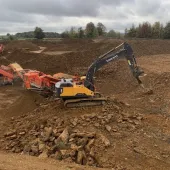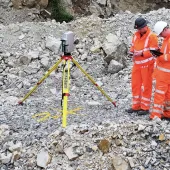Government urged to rethink planning reforms

Planning is about more than housing; it is about mineral extraction and products, says Mineral Product Association
THE Mineral Products Association (MPA) has urged the Government to refine and strengthen the existing minerals planning system, rather than embark on wholesale, destabilizing restructuring under the reforms outlined in the planning white paper ‘Planning for the Future’.
The Association stresses that planning is about more than housing, and that the minerals planning system already operates differently to other forms of spatial planning, reflecting the nature of minerals distribution and development, which is dictated by geology. Minerals can only be extracted where they occur whereas homes can be built anywhere, says the MPA.
In its consultation response, the MPA called for a strong national ‘statement of need’ for minerals, including production of up-to-date forecasts for future demand from house building and infrastructure. It also urged continued support for national data collation and support for the operation of the regional Aggregates Working Parties (AWPs), which would strengthen strategic planning for, and consequent supply of, sufficient minerals for the economy.
Development of all types, and the economy as a whole, depend on the sustainable supply of essential minerals, with UK mineral extraction totalling 210 million tonnes per year and contributing to the largest material flow in the economy. The UK Minerals Strategy identified demand for around 5 billion tonnes of primary materials over the next 25 years, as both minerals and mineral products. This is predominantly construction aggregates but also material for industrial uses, with the majority coming from primary indigenous sources.
Supplying this demand, says the MPA, will require the planning system to identify sufficient suitable sites and grant planning applications, together with environmental permitting allowing production. However, MPA surveys have shown that over the last decade land-sourced aggregates consumption outstripped reserves newly permitted for extraction, with only 75% (crushed rock) and 63% (sand and gravel) replenished – a trend that could have a serious impact on the country’s ability to realize its regeneration and growth ambitions in the long term.
The MPA released its own proposals to improve the performance of the mineral planning system in light of the reforms being proposed for the wider planning system.
The Association has highlighted that while the key components of the current system are sound, effective implementation is hindered by a lack of resourcing, confidence and a skills shortage. As with housing, a stronger and clearer lead at national level is also needed to provide a necessary ‘push’ to ensure that society’s need for minerals is properly assessed, provided for and met.
The MPA’s executive director for planning, Mark Russell, said: ‘The minerals planning system should continue to be an upper-tier authority function, reflecting the strategic nature of minerals distribution, supply and demand. Geology matters, with minerals only able to be worked where they are located. The National Planning Policy Framework recognizes that minerals are essential to our economy and quality of life. However, supply cannot be assumed; it needs planning, monitoring and management. Without a steady and adequate supply of minerals the Government cannot deliver its ambitions for housing, infrastructure and regional growth.’
MPA chief executive Nigel Jackson added: ‘The proposals for planning reform outlined in the Government’s white paper unsurprisingly centre on increasing delivery of new housing, but unfortunately to the extent of excluding consideration of any other aspect of the land-use planning system. Local planning is about more than housing delivery alone, and it is vital for policymakers to make the link between their ambitions on housing and the need for a steady and adequate supply of the essential minerals.
‘The Managed Aggregate Supply System (MASS) should provide a structure to support the delivery of these essential mineral supplies, but the central government funding that underpins the delivery of MASS has significantly reduced. Supply cannot be assumed, it needs to be planned for, monitored and managed. In reality, minerals are critical to national infrastructure and recognition of this is the first step in ensuring that the planning system is fit for the future. We are keen to work with national and local government to ensure this review delivers more certainty to boost confidence to invest and regrow the economy.’









